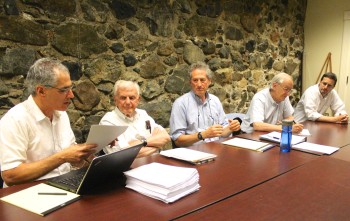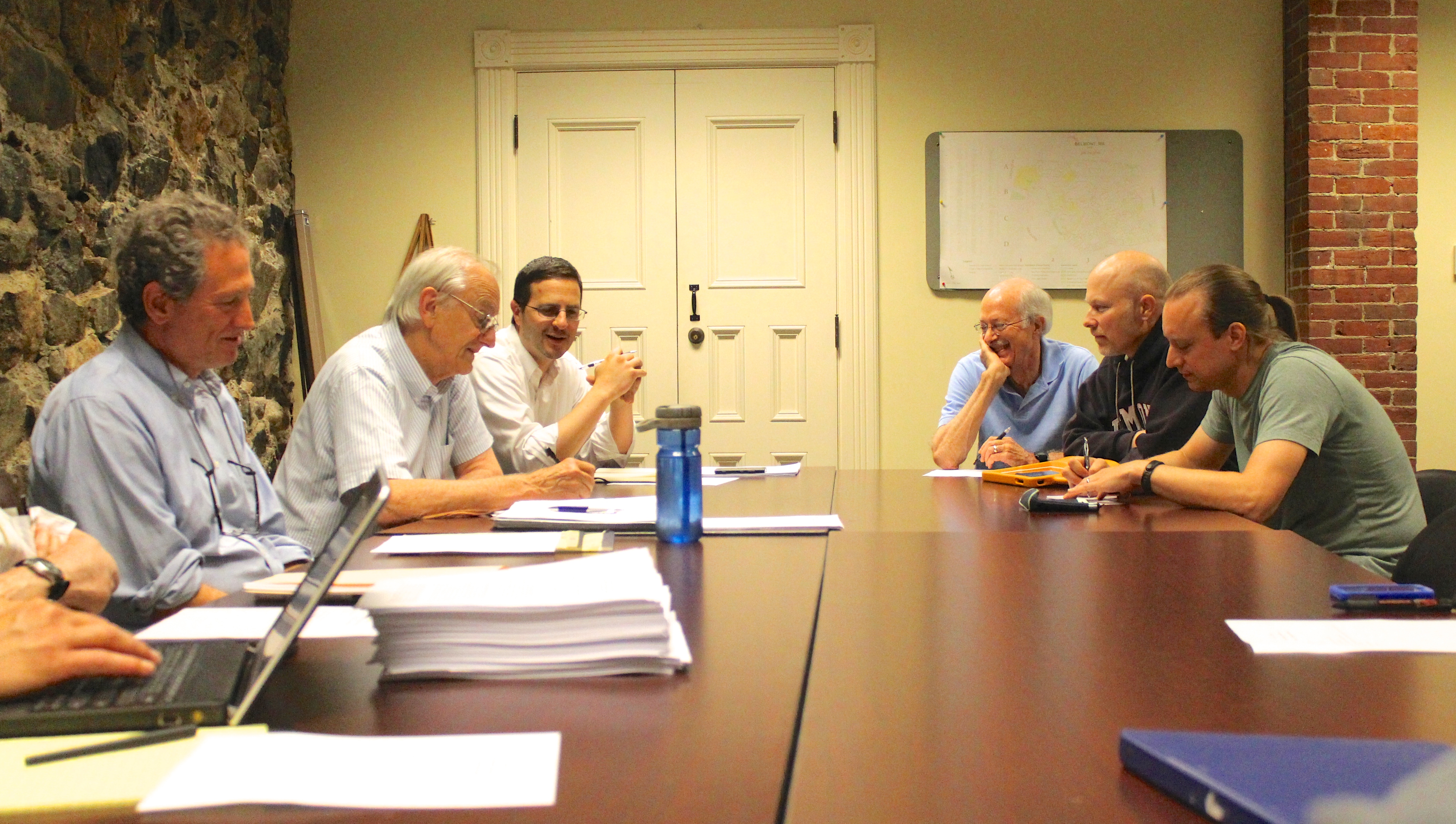Photo: (from left) Stephen Klionsky, Jake Jacoby and Tony Barnes of the working group and residents Mark Davis, Klaus Becker and Travis Franck.
How much are you willing to pay for your neighbor to use solar power?
It’s that question likely at the heart of the main recommendation coming from the Temporary Net Metering Working Advisory Group after the newly-formed committee held its inaugural meeting at Town Hall on Monday, July 6.
With a dozen solar power advocates in attendance, the five-member committee (three voting members and two alternates) set its accelerated agenda – with an additional meeting this week and three the next – with a goal of presenting a comprehensive report and recommendation in early to mid-August to the Belmont Light Board made up of the Board of Selectmen.
“I thought one of our major goals was to convince the community particularly the solar community that we are credible and we have their interests at heart as well as the rest of the town,” Roy Epstein, the committee’s chair, told the Belmontonian at the conclusion of the first assembly.
The committee was formed by the Light Board last month to make progress on finalizing a solar policy at Belmont Light, according to Board Chair Sami Baghdady
Epstein said the committee’s ultimate goal is to create a fairly long-term rate policy – a tariff for solar energy in Belmont – “as expeditiously as we can.”
The meeting opened with Epstein being elected chair, which caused a stir among many solar advocates as they directly questioned Epstein selection to the committee as he had written a widely-read commentary this year viewed as hostile to advancing their cause.
Epstein – an economist and long-time member of the town’s Warrant Committee – sought to claim skeptics by saying no one could question “the goodwill of the people on this committee (which include fellow voting members Henry “Jake” Jacoby and Stephen Klionsky and associate members Tony Barnes and Robert Gallant) their openness, their receptiveness … and personal integrity so it would be not less than unfair to doubt any of that.”
Epstein added that the issue of solar power pricing – which has become the most contentious topic in Belmont for the past year – “needs to be defused a little bit” and that would occur through the next two weeks as the committee will seek to effectively deconstruct and reassemble the solar power issue facing Belmont and its municipal electrical utility, Belmont Light.
To prevent the meetings turning into a debating society, Epstein placed a ban on public discussion until the final 15 minutes of each meeting, a rare show of restraining the populous in Belmont.
Klionsky, a current member of the Municipal Light Advisory Board which has been seen by some as the chief barrier to a progressive solar policy, noted that “it really is unfortunate” the emotion and negative comments over the past year set back progress on the issue.
The committee appears ready not simply to look at net metering – the billing mechanism that credits solar energy system owners for the electricity they send to Belmont Light – which Klionsky called “not the most important topic in terms of climate change” – but also the long-term goals of reducing the town’s overall carbon foot print.
In coming to a new solar policy, Epstein said they will not follow past initiatives such as the proposed “Phase II” tariff program approved by the Light Board in December but then ditched by the board in April at the insistence of solar power advocates.
“We’re free to propose anything we want” in developing solar policy, said Epstein, seeking to shake off past blueprints “that turned into shouting matches between MLAB and some of the residents,” noted Klionsky.
In one aspect, Epstein agrees with the newest member of the Light Board, Jim Williams, who is the solar proponents staunchest ally, that there is a “board middle” between the two competing sides to establish a new policy.
But just how generous a tariff, or subsidy, should be provided to solar users from Belmont Light and the vast majority of its customers – only 23 residential consumers of 11,000 have active solar panels – who will pay the tariff?
Solar advocates claim a progressive tariff – calculated by Belmont Light at $25,000 over 20 years under pure net metering without any cost to help with the utilities fix costs – is the best and most efficient approach to promote solar power use in Belmont as up front costs can reach $20,000 to $30,000.

The Working Group: (from left) Roy Epstein, Robert Gallant, Stephen Klionsky, Henry “Jake” Jacoby and Tony Barnes.
In Epstein’s view, the committee’s aim is “to inducing some solar without excessive compensation.”
“The goal for the public is to encourage the use of solar but by the most efficient means possible,” he said, something that is “good enough” for solar proponents.
While Epstein said he did not want to use the term “cross subsidy” – the practice of charging higher prices to one group of consumers in order to subsidize lower prices for another group – as it has become a “loaded term,” Jacoby – the William F. Pounds Professor of Management, Emeritus at MIT Sloan School and a leading expert on national climate policies – said “you can call it a banana” but the facts are that a “transfer [of costs] is there.”
Yet reaching a “good enough” level that will satisfy solar advocates remains an open question. While the Working Group is preparing to marshal on with data, many pro-solar advocates view the issues in a social benefit context.
One solar proponent was upfront with his call for major subsidies for residents who wish to go solar.
“I find the existence of this group very cynical,” said Selwyn Road’s Mark Robbins, saying that solar renewable energy credits (SREC) – a Massachusetts initiative in which large utilities such as National Grid and Eversource purchase the credits from consumers using solar panels – is the preferred method of encouraging solar usage and not via net metering.
“And what are SREC’s? They’re really cross subsidies from the rest of Massachusetts which cares about climate change to a town that doesn’t,” he said. “These things depend on subsidies. We’re suppose to be subsidizing these things.”
A nuisance view of the committee’s work from the solar perspectives came from Travis Franck, who said while it is important to have an efficient and reasonable policy, “luckily the working group has a mandate to consider the town’s broader picture not just Belmont Light’s bottom line.”
“There are ways to structure this that will be reasonable for the solar panel owners and good for the average rate payer and could meet the town’s climate change goals,” said Franck, program director for DC-based Climate Interactive.
Epstein said after the meeting from an economic point of view, “the goal is to [incentivize] behavior but only as much as necessary and no more.”
“I want to present a proposed framework where people are able to tell whether that that incentive exists or not.”








Franklin,
From your opening statement it looks as though you have already made up your mind by propagating the notion of a ‘subsidy’ from rate-payers to solar hosts. There is a large amount of data which shows just the opposite is true: that if you take everything into account; social, environmental, as well as financial, you actually end up with solar hosts ‘subsidizing’ the rest of the Town. MLAB never took any of that into account. I doubt that there is time enough for this working group to do so either, but we are hopeful that they will at least come up with a tariff which recognizes those benefits and is fair to everyone. It is our strong desire to bring a lot more residential solar PV into Town to achieve the Town’s stated goal of reducing its carbon footprint.
Darrell
“…only as much as necessary and no more.” That is a the heart of this issue…how much is enough? If 15% of MA is solar-suitable, perhaps that is a target. What is the target capability of solar for the 80% reduction needed, indeed supported by voters several years ago? Hopefully this committee will not just be band-aiding a policy to silence the few who have already led the way with residential solar. We should be looking to significant solar adoption to achieve our reduction goals – community based, town-based, both and all the other renewables and energy efficiency strategies if we are to improve our conditions.